#tang dynasty poetry
Explore tagged Tumblr posts
Text
Array of Longing Pear Blossom 相思梨花陣
Dí FeiSheng never really walked out of it, did he?

日暮嘉陵江水東,梨花萬片逐江風。
江花何處最腸斷,半落江流半在空。
元稹 Yuán Zhen - 使東川。 江花落 Flowers falling into Eastward river (Tang Dynasty)
As sun sets over the JiaLíng River flowing east 。 Ten thousands of pear blossom chase (caught in) the river wind。What chops my guts(/breaks my heart) as I watch the flowers flow? 。Half have fallen (helplessly) in the river, (only) half drifted in the air.
...☕?/commission
#mysterious lotus casebook#di feisheng#shaoshi#cdrama#fanart#lyselkatzcreations#tang dynasty poetry#lysel's savage translations#sorry a-Fei#i hurt my faves when I'm hurting#it has been a difficult fortnight#jiêjie loves you!
191 notes
·
View notes
Text

Seven-character Buddhist scroll, by Kogetsu Sogan (1574-1643). After a poem by Tang-dynasty poet Liu Shang (12th century).
The original poem translates as ‘Since you left Mount Shunzan, I have no friend to play games with.’ In the original language this reflected a sense of loss, poignancy, but also acceptance.
105 notes
·
View notes
Text
Closely connected to the act of name signing was the act of writing poems on walls. As scholars have already pointed out, with beginnings traceable to the Six Dynasties, wall poems (tibishi) were already very widespread during the Tang. By Christopher Nugent's count, well over one thousand entries in the Complete Tang Poems had titles indicating that they began as inscriptions on some surface other than paper or scrolls. These surfaces included walls at places of gathering and transit, such as post stations, scenic sites, inns, and increasingly in the latter part of the Tang, Buddhist temples, which also served public roles for lay gatherings and performances. (100)
In one anecdote, a latecomer casts aspersions on a first writer's literary skills, comparing him to the general Xiang Yu (232-202 BCE), who was infamous for having learned just enough writing to manage his name: "Li Tang signed his name on a pavilion in Zhaoying County. When Wei Zhan [jinshi degree 865] saw it, he took a brush and dashed off a taunt: 'The rivers of Wei and Qin brighten the eyes, / but why is Xiren short on poetic spirit? / Perhaps he mastered only what Beauty Yu's husband could / learning to write just enough to put down his name.' " ... It would not be a stretch to imagine the sniggering of those who read this inscription in a frequented pavilion. (102)
For a degree seeker in Chang'an, these circuits of information and judgment received more discussion than the actual examination itself. Tang literati wrote copiously about activities such as name signing, public exposure, and triumph. It would not be an exaggeration to say that in ninth-century temples and popular recreation areas, the vertical spaces were teeming with verses that clamored for attention. (104)
selections on poetic graffiti from linda rui feng's city of marvel and transformation: chang'an and narratives of experience in tang dynasty china (university of hawaii press, 2015)
#china#tang dynasty#tagamemnon#<- couldn't stop thinking about graffiti from pompeii while reading this chapter so i suspect it may be of interest to rome-heads in genera#this was very promising book that felt like it failed to fully deliver - can't tell if the author was trying not to get into aspects which-#-have a paucity of surviving sources or if perhaps she was trying to avoid stepping on the toes of existing scholarship#e.g. nugent's mentioned book on poetry production/circulation or juduth zeitlin's article on wall poems and anxieties of loss#but even though i felt like it needed another 50-100 pages of fleshing out there are some generally remarkable moments in here#bits that can be put in remarkable parallel with imperial rome certainly; more fascinatingly with 19th- and early 20th-century fiction-#-that deals closely with 'new' modern urban life. where the forms & patterns of the city itself collude with residents against the newcomer#some interesting notes on bai juyi in here too. though i don't know if they're news to any real bai juyi stans out there
39 notes
·
View notes
Text
Movie ramble about “长安三万里”
Just watched “长安三万里”(30 thousand miles from Chang’an). Despite the historical inaccuracies, it has got to be one of the best films I have seen this year, next to across the spiderverse. The animation is compatible, if not, better than Disney. It is almost 3hrs long but I found is really appealing. Your liking towards the movie may depend on your knowledge about the people and the history(everyone in the movie are historical figures apart from background characters). The movie is about the story of a famous poet, “李白/Li Bai” narrated by “高适/Gao Shi”, who in the movie, is a close friend of his. It has a lot of poetry and poet stuff in it. Many famous Tang dynasty poets are included. It’s set in the Tang Dynasty with some stuff about the An Lushan rebellion. Don’t know if it’s available internationally, but it’s worth a watch if your interested in Chinese history and Tang Dynasty poets and poetry.
#not hetalia#random movie ramble#it’s kinda long so it could be boring to some#movie opinions#chinese animation#chinese movie#长安三万里#tang dynasty stuff is always great#chinese poetry#Chinese poets
150 notes
·
View notes
Text
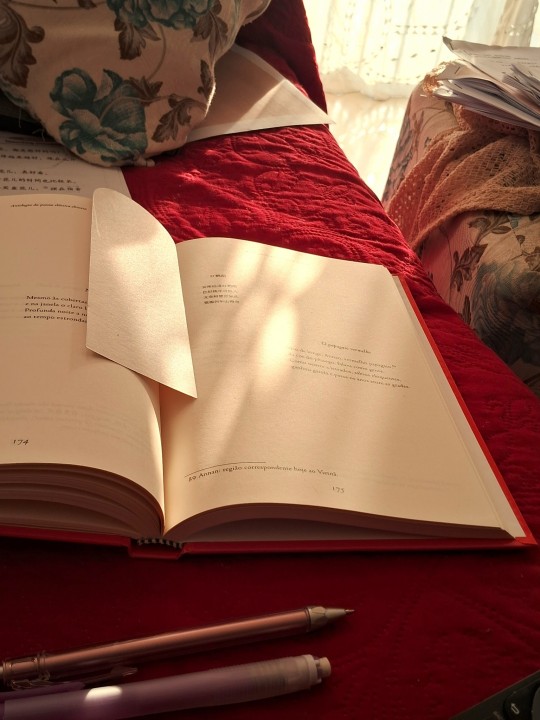
Book of Tang poetry (and messy piles of pages from New Practical Chinese Reader) on the couch in the sunset on a lazy Sunday afternoon
The book is open on 白居易 (Bai Juyi)'s 红鹦鹉 (Red Parrot).
There are many unknown characters for me and English translations I've found are a bit different from the Portuguese translation on the book, and on my very quick search I've already found criticism on them... so here's a translation of the translation:
The Red Parrot Came from far, Annan*, a red parrot. The color of peach, spoke like a person. As happens to wise, eloquent scholars, Got a cage and spends the years between bars.
*present-day Vietnam
#personal#poetry#chinese poetry#tang dynasty#bai juyi#白居易#translation#chinese poem#langblr#studyblr#chinese langblr
31 notes
·
View notes
Text
The peril of love is not in loving too often, A single evening can leave its wound in the soul.
Meng Chiao, Impromptu
#Meng Chiao#Meng Jiao#Impromptu#Poems of the Late T'ang#love#love quotes#unrequited love#heartbreak#Chinese literature#Chinese poetry#Tang poetry#Tang dynasty#poetry#poetry quotes#quotes#quotes blog#literary quotes#literature quotes#literature#book quotes#books
43 notes
·
View notes
Text
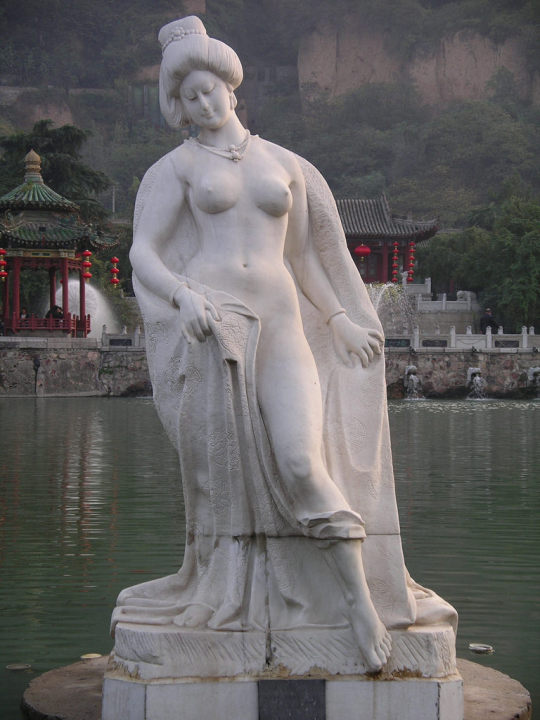
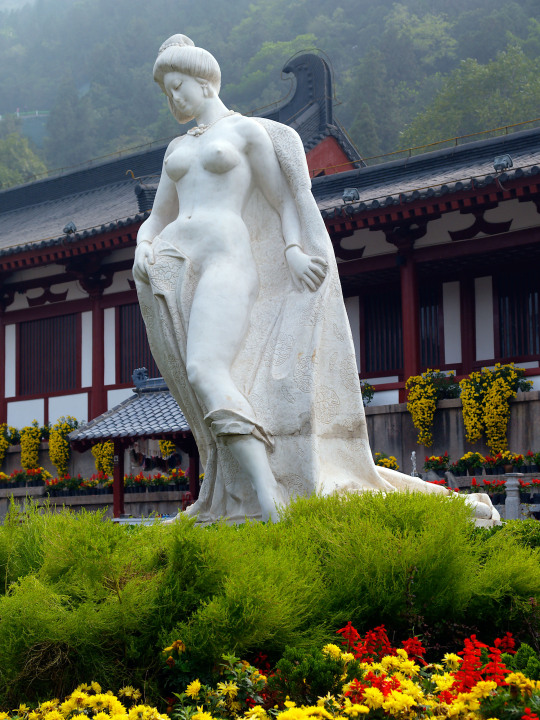

Statue of Yang Guifei at Huaqing Pool 20th-21st C. CE
"The waters of the [Huaqing pool] hot springs were smooth, and washed over her pale white skin.
The palace maids helped her to leave the pool, because she was too delicate and lacked strength.
She had dark black hair, and the face of a flower, with golden jewelry dangling from her hair.
The sound of the war drums from Yuyang began to shake the earth,
And broke the spell of the Song of rainbow skirts and feather robes.
Smoke and dust descended upon the nine layered watchtowers of the imperial palace,
Traveling more than one hundred li from the western gate of the capital.
The six armies of the emperor refused to advance any further, so the emperor was left without a choice,
The writhing fair maiden, whose long and slender eyebrows resembled the feathery feelers of a moth, died in front of the horses.
Her ornate headdress fell to the ground, and nobody picked it up;
Then her kingfisher hair ornament, her gold sparrow hairpin and her jade hair clasp.
His Majesty covered his face, for he could not save her.
Looking back, he saw a stream of blood and tears mixing together."
-Composed by Bai Juyi in the year 806, The Song of Everlasting Regret (or Sorrow) details the events surrounding the death of the lady Yang Guifei during the Anshi [An-Lushan] Rebellion in 755.
#chinese art#chinese history#tang dynasty#ancient history#ancient china#history#literature#poems and poetry#art#antiquities#sculpture#statue#ancient literature
40 notes
·
View notes
Text
ok so a few months ago for absolutely no reason whatsoever* I wanted poetry about gulls specifically Chinese poetry and Google threw up a translation of Gull by Du Fu which I loved so much and kept it on open tab and read it like a gazillion times and basically adored it and when I wanted to read it again recently IT WAS GONE
GONE
No gull by dufu only gull anthologies dissertations and dufu collections please I just want Gull I don't want to slog though badly indexed poetry collections so the ONLY SOLUTION is to search for the Chinese title because of course Ou by Du Fu will work but nooooooo it does not I am betrayed **
Anyway ignoring that dumbassery above the next ONLY SOLUTION is to search for 鸥杜甫 and thank god for baidu and mtl only
The cold gulls in Jiangpu are playing, and I will be spared without others. But I want to turn over jade feathers and light spring seedlings at will. You still have to take a bath when the snow is dark, but the wind is free to drift. A few groups on the sea, the clear shadows of the sun are shining
it kinda sucks because where is my lovely beautiful imagery what you still have to take a bath when the snow is dark am I reading but naturally mtl cannot cope with poetics this is asking for too much so the final ONLY SOLUTION is obviously to translate it myself with my skeevy linguine skeelz*** wish me luckkkkkkk
*this is ofc true
** in case this is not yet obvious I do not believe in punctuation
*** special technique! noodle translation
#poetry#chinese poetry#poem#translated literature#du fu#tang dynasty#words#words words words#gull#杜甫#鸥
5 notes
·
View notes
Text
youtube
獨奏:謝從馨 Solo: HSIEH Tsung-Hsin 指揮:任燕平 Conductor: JEN Yen-Ping 錫穗國樂團 Xisui Chinese Orchestra / xsco2012 《錫穗風采》2020-08-13 於臺北市國家音樂廳
打擊樂協奏曲《商銅》王辰威 作曲 Concerto for Chinese Percussion «Bronze Age of Shang» Composed by Wang Chenwei https://wangchenwei.wordpress.com/
Three thousand years ago, the Shāng Dynasty bequeathed two cultural treasures to China: the oracle bone script and Chinese bronzeware. The exquisite craftsmanship and design of Shāng bronzeware bear witness to the illustrious history of ancient China. Inspired by an exhibition of Shāng Dynasty ritual objects and musical instruments at the National Palace Museum in Taipei, this concerto exclusively features Chinese percussion instruments. It evokes the grandeur of the Shāng Dynasty through three movements, each themed after a type of bronzeware.
First Movement: Yuè – Battle Axe of Kings
The Yuè was a weapon that doubled as a ceremonial object, symbolising a king’s military command. This movement depicts King Tāng of Shāng rallying his vast army to campaign against the ruthless King Jié of Xià in 1600 BCE.
The soloist performs on the Jiàngǔ (mounted drum) and Páigǔ (arrayed drums) while the wind instruments carry the melody. To evoke the clash of weaponry, the orchestra musicians strike with wooden sticks and stomp their feet to portray infantry drills.
Second Movement: Jué – Wine Vessel of Aristocrats
The Jué was a wine vessel used by rulers and aristocrats on occasions such as forging alliances, going out to war and celebrating victories. This elegant and relaxed movement conjures images of a palace banquet with intermingling winecups and graceful dancers.
The soloist plays rhythmic figures with relative pitches on suspended Chinese cymbals and gongs. Bamboo clappers are used in the middle section. At the beginning and end, the soloist presses a cymbal on a gong while playing tremolo on the gong to imitate the sound of pouring wine. Plucked string instruments are featured for the melody, incorporating techniques like slides, pitch bends and harmonics.
Third Movement: Dǐng – Ritual Cauldron of Sovereignty
The Dǐng, a cooking vessel, became a ritual and ceremonial object symbolising a country’s sovereignty and was adorned with ancient Chinese characters engraved in the bronze script. The movement’s main motif, “D-G-A”, comprises three notes separated by the musical interval of fourths, symbolising the ancient three-legged and four-legged Dǐng.
The soloist plays the Biānzhōng (pitched bells), Yúnluó (pitched gongs), Huāpéngǔ (low drum), Xiǎochǎ (small cymbals) and Fēngluó (thin gong). Some segments involve one hand playing pitched notes on the Yúnluó and the other hand simultaneously playing unpitched rhythmic accompaniment on the drum. The main theme, presented by the bowed string instruments, is stately and dignified, portraying the vast and prosperous lands of the Shāng dynasty.
A highlight of this movement is the recitation by the orchestra of a verse from the poem The Swallow from Poetry Classics: Shāng Odes using Old Chinese pronunciation (a scholars’ reconstruction of Chinese pronunciation two millennia ago). The meaning of the verse is as follows:
Heaven mandated the swallow, To descend and give birth to the Shāng, Dwelling in Yīn, a vast state. God appointed the martial Tāng, To secure the kingdom great.
Commissioned and premiered by the Taipei Chinese Orchestra in 2019, this piece has since been performed by several other orchestras, including the Taoyuan Chinese Orchestra, Kaohsiung City Chinese Orchestra, and Beijing Chinese Orchestra.
#history#military history#music#music history#chinese music#music recs#culinary history#poetry#shang dynasty#tang of shang#jie of xia#percussion#drums#jiangu#paigu#cymbals#gongs#bianzhong#yunluo#huapengu#xiaocha#fengluo#wang chenwei#classic of poetry#axes#yue#cauldrons#ding#jue#wine
6 notes
·
View notes
Text
COMMISSION OPEN - November 2023
Array of Longing Pear Blossom 相思梨花陣
Dí FeiSheng never really walked out of it, did he?

日暮嘉陵江水東,梨花萬片逐江風。
江花何處最腸斷,半落江流半在空。
元稹 Yuán Zhen - 使東川。 江花落 Flowers falling into Eastward river (Tang Dynasty)
As sun sets over the JiaLíng River flowing east 。 Ten thousands of pear blossom chase (caught in) the river wind。What chops my guts(/breaks my heart) as I watch the flowers flow? 。Half have fallen (helplessly) in the river, (only) half drifted in the air.
...☕?/commission
#mysterious lotus casebook#di feisheng#shaoshi#cdrama#lyselkatzcreations#lysel's savage translations#tang dynasty poetry#shameless self reblog from my main
191 notes
·
View notes
Text
The battle is over, the Threnodian defeated, and Jiyan and the Rover have a heart-to-heart.
Or:
Tang dynasty poetry serves as convenient cover for self-determination.
#jiyan#wuwa rover#jiyan x rover#character study#the mortifying ordeal of being known#are they friends? are they lovers? who knows#are they bonded by immense trauma? absolutely#misuse of tang dynasty poetry and flagrant abuse of ts eliot#my writing
2 notes
·
View notes
Text
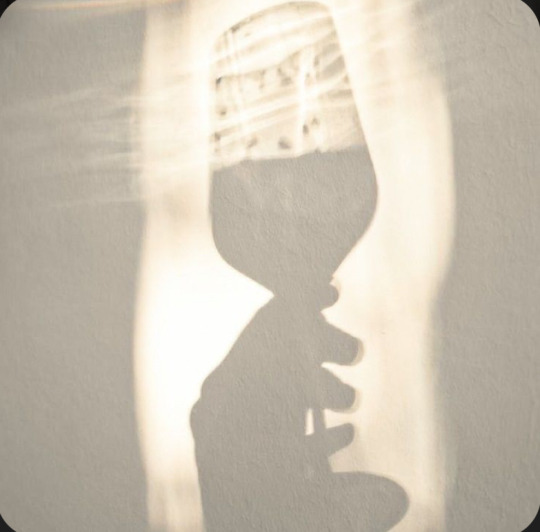
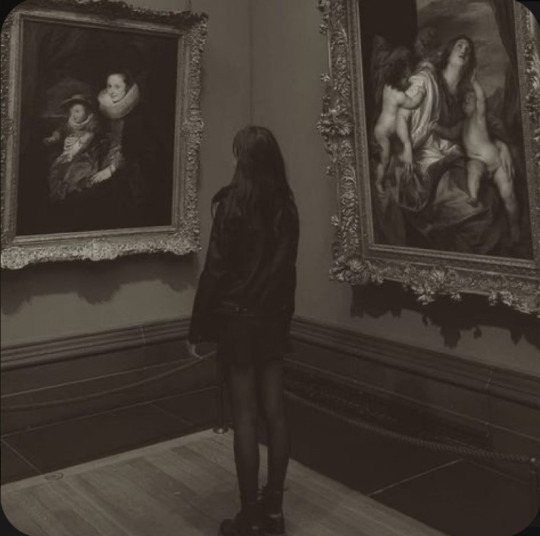




happy ttpd release night!
about thirty minutes to go and i’m freaking out!
#taylor swift#the tortured poets department#ttpd#all’s fair in love and poetry#this album is gonna kill me#i also have three exams tomorrow and i’m staying up to listen to it one million times but we’re not gonna talk abt that#the tang dynasty can wait
3 notes
·
View notes
Text
In the year 827, it was from the Zhongnan Mountains that Bai Juyi wrote the following lines, tracing out a sight line from one of its peaks to the very gate of the imperial palace in Chang'an: Upon Ascending Guanyin Terrace, Looking towards the City The myriad houses resemble the chessboard, The dozen avenues like planted furrows. From far off, pinprick torchlights going to court can be discerned, A stringed constellation west of the Five Gates. Households, wide avenues, the Daming Palace opening its gates to the courtiers at dawn: in just two couplets the poet enumerates the population and infrastructure count of the city. At the root of this is the grid, a spatial mechanism that thrives on its regularity and which can extrapolate small units into infinity. Bai Juyi's vision of Chang'an -- rule governed, panoramic in its totality, and keyed into worldly affairs -- is reminiscent of Du Fu's lines sixty years earlier from his Autumn Meditations series: "It's been said that Chang'an resembles chess / a hundred years of worldly affairs more than grief can bear." In Bai Juyi's case, when read in the context of poems composed in the capital-gazing tradition, his poem from the Zhongnan Mountains imparts less about Chang'an itself than it does about the mindscape of the gazer. ... In this poem, empirical observation plays second fiddle to an idealized view of the capital. This view, as Bai Juyi articulates elsewhere, equates the geometric regularity of the capital with its proper governance: "The capital is of four sides square / Such is the root of the kingly influences." The idealized vista Bai Juyi describes has been assimilated into what he already knows to be the order and rhythm of the capital. As someone who was in the past frequently among the "torchlights going to court," the fifty-six-year-old poet also maps his own identity onto the functioning mechanism of the state bureaucracy. (56)
linda rui feng, city of marvel and transformation: chang'an and narratives of experience in tang dynasty china (university of hawaii press, 2015)
#china#tang dynasty#bai juyi#poetry#n.b. for 'chess' read more exactly 'weiqi' or 'go'; played not on checked squares but on a true grid
6 notes
·
View notes
Photo

“Staying in the Mountains in Summer” by Chinese poet Yu Xuanji (844–871), one of the most legendary female poets of the Tang dynasty
20 notes
·
View notes
Text
春望 ("Spring View") by 杜甫 (Du Fu) is my February poem for the 2024 dostoyevsky-official challenge by @dostoyevsky-official.

Yes, I recited it from memory. No, I cannot write all those characters from memory.
I wrote a translation of the poem below, inspired by Vickie Fang's. There are different interpretations for the third and fourth lines - "感时花溅泪,恨别鸟惊心" (such as the one in From Meter to Meaning). I believe this one makes more sense in relation to the previous lines (there is war and suffering going on, but nature is indifferent and spring flowers are blooming anyway).
春望 chūn wàng Spring View
国破山河在 guó pò shān hé zài The nation is broken, the mountains and rivers remain
城春草木深 chéng chūn cǎomù shēn Spring in the city, the vegetation grows deeply.
感时花溅泪 gǎn shí huā jiàn lèi Moved by the moment, I shed tears on the flowers
恨别鸟惊心 hèn bié niǎo jīng xīn Sorrowful for the separation, my heart is startled by birds.
烽火连三月 fēnghuǒ lián sān yuè The beacon fires have been burning for three months
家书抵万金 jiā shū dǐ wàn jīn A letter from home is worth ten thousand pieces of gold.
白头搔更短 bái tóu sāo gèng duǎn My white hair, scratched thinner,
浑欲不胜簪 hún yù bù shēng zān Can barely hold a hairpin anymore.
This poem was written by Du Fu in the late spring of 757 AD during the An Lushan Rebellion. An Lushan was a regional military commander in the northern part of the then Tang Dynasty, and he rebelled against the Tang Dynasty at the end of 755. In July of 756, An’s rebel forces captured Chang’an, the capital of the Tang Dynasty. The city was looted and burned by the rebel forces. Du Fu arranged for his wife to stay at the Lu Province, a place north of Chang’an, while Du Fu himself continued his journey north to Ling Wu to join the new emperor Su Zong. However, he was caught by the rebel forces during his journey north, and was taken back to Chang’an as a prisoner. It is said that Du Fu wrote this poem when staying in Chang’an as a prisoner of the rebel forces.
(source: Classic Chinese Poetry by Jean Yuan and Vickie Fang)
#challenge#poetry challenge#my voice#du fu#杜甫#poetry#chinese poetry#tang dynasty#chinese poem#chinese literature#studyblr#langblr#chinese langblr#chinese language#mandarinblr#中文#春望#translation
20 notes
·
View notes
Text
The stars came out like sprinkled sand Disputing which could shine the brightest
Lu T'ung, The Eclipse of the Moon
#Lu T'ung#Lu Tong#The Eclipse of the Moon#Poems of the Late T'ang#stars#star quotes#sand#shining star#Tang poetry#Tang dynasty#Chinese poetry#poetry#poetry quotes#quotes#quotes blog#literary quotes#literature quotes#literature#book quotes#books#Yuchuanzi
30 notes
·
View notes